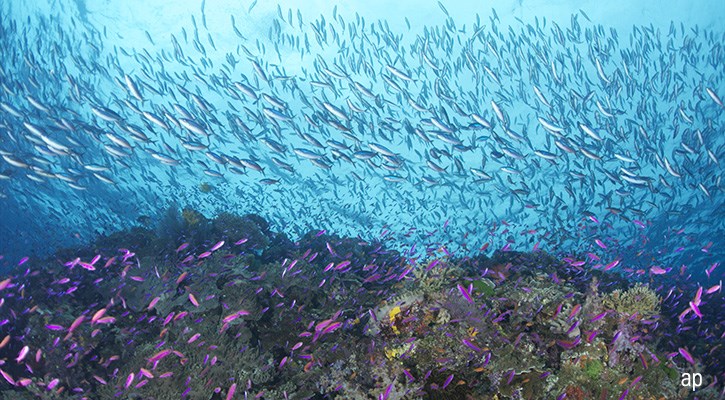
COP26 may be garnering headlines, but it has an overlooked little sibling, COP15, which may prove to be every bit as important. Taking place in China in until October 24, COP15 focuses on biodiversity, which could become a new frontier in sustainable investment as it becomes clear that climate change is not the only problem for the planet.
Global organisations have already started to turn their attention to biodiversity loss and its impact. In June, the UN Convention on Biological Diversity (CBD) set out a series of goals to help turn the tide on the ecological destruction of Earth by the end of 2030. These goals included reducing pesticide use by two-thirds, halving the rate of invasive species introduction and eliminating plastic pollution.
The European Commission recently adopted the new EU Biodiversity Strategy for 2030. It also aims to put Europe's biodiversity on a path to recovery by 2030, which includes transforming at least 30% of Europe's lands and seas into well-managed protected areas. The UK’s government has also recently unveiled reforms to agricultural funding in England. Titled the ‘Path to Sustainable Farming’ it includes a commitment to return land to nature and to re-establish woodlands.
The problem is every bit as urgent as climate change. UN assessments suggest that one million species are at risk of extinction, which is an immediate threaten to the ecosystems that produce the food and water on which human life depends.
By extension, it is also a problem for business. This biodiversity loss comes with a price tag. Daniele Cat Berro, investment associate at ESG specialist MainStreet Partners, says that ecosystem services delivered by biodiversity, such as crop pollination, water purification, flood protection and carbon sequestration, are worth an estimated $125-140 trillion per year globally – or one and a half times global GDP: "Between 1997 and 2011, the world lost an estimated $4-20 trillion per year in ecosystem services owing to land-cover change and $6-11 trillion per year from land degradation.”
Business Risk
Companies are taking note. In 2020, a group of 700 global companies, with combined revenues of $4.3 trillion and including big names such as Burberry (BRBY), Citigroup (C) and Procter & Gamble (PG) joined Business for Nature’s call for governments to reverse nature loss by 2030. In September, more than 100 organisations issued a joint call for governments to strengthen the post-2020 Global Biodiversity Framework being negotiated by governments.
Investors increasingly recognise biodiversity issues as a significant risk for businesses. Liudmila Strakodonskaya, ESG analyst at AXA Investment Managers says: “Biological diversity is the infrastructure which supports all life on earth and it is essential to have in mind that biodiversity is a systemic risk and of equivalent significance to climate change.
The company sees significant economic risks related to potential fluctuations in raw material costs, disruptions in operations and supply chains. This is in the context of transition risks related to increasing regulation initiatives on biodiversity restoration around the world.
Strakodonskaya adds: “These environmental issues will jeopardise business operations and therefore potentially represent an investment risk for the investors supporting these companies. Biodiversity also acts as a great natural protection against extreme climate events. Mangroves and barrier reefs, for instance, protect seashores against storms and floods. Their destruction exposes companies to more climate related physical risks.”
That is the risk side, but there are also companies that are helping solve the crisis. Cat Berro says: “We predict there will be two kinds of winners: first, companies that directly and indirectly create solutions for biodiversity protection and, second, companies that consider the risk of biodiversity in order to protect themselves and develop proper biodiversity policy.
"In the first group – those creating solutions – we highlight four subsectors: companies responsible for reducing pollution; those involved in clean energy provision; transportation businesses aiding the transition to cleaner alternatives; and those working towards sustainable fishing and farming.” He highlights waste management companies such as Republic Services and sustainable packaging leader Mondi. Wind turbine group Vestas and photovoltaic solutions group First Solar may also benefit.
Precision Farming
Stuart Forbes, co-founder at Rize ETF, says the consumer-led revolution in plant-based foods also presents a raft of new investment opportunities for eco-savvy investors. He adds: “The value of the plant-based meat market is now on track to rise from $10.1 billion in 2018 to $30.92 billion in 2026. And as this occurs, more and more of these private companies will go public.”
Precision farming - or “farming 4.0” as it is sometimes referred to – is another area of opportunity, he says: “As the need to produce crops more cheaply and efficiently intensifies, the precision farming industry is beginning to take off. Until now, farming was the last major industry to be penetrated by technology. Now, advanced technologies including robotics, sensors, software and aerial and satellite imagery are being combined with big data and cloud-based solutions to enable more precision and automation (and therefore resource efficiency) within the farming process.”
As climate change analysis enters the mainstream, biodiversity may be the next frontier. It is drawing the attention of policymakers and regulators, while investors are starting to realise that it represents a significant risk to companies’ sustainability. Nevertheless, it could bring real opportunities for companies with the tools to address the problem.



























